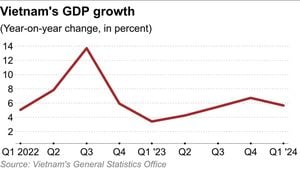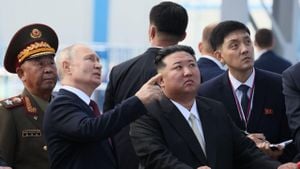With just three days left until Election Day, both Donald Trump and Kamala Harris are making their final pitches to voters as they campaign across key battleground states. On this pivotal weekend, both candidates know the importance of swing states like North Carolina, Georgia, and Wisconsin—the areas likely to decide the outcome of the election.
During their events, Trump, the Republican nominee and former president, was spotted campaigning vigorously at rallies, including one held on Friday where he repeated discredited claims about voter fraud and election integrity. One notable comment came when Trump responded to criticism about previous incendiary remarks concerning Liz Cheney, who has been vocal in her support for Harris. “She should face nine barrels,” he had originally suggested concerning Cheney—a statement widely viewed as threatening. Trump, who has previously leaned heavily on aggressive rhetoric, seemed to temper his tone slightly at his recent rally, refraining from the violent imagery he has previously used. Instead, he focused on less inflammatory issues, from immigration to inflation, often meandering through various tangents.
Despite the waning days of the campaign, Trump maintained his characteristic bravado. He emphasized his support among women voters, asserting, “I think the women love me.” His messaging attempts to convey strength and determination appeared aimed at rectifying reports showing he lagged behind among female voters.
Meanwhile, Vice President Kamala Harris is also ramping up her campaign efforts. Harris held star-studded events, including appearances with famous figures such as Jon Bon Jovi and celebrities including Spike Lee and Kerry Washington. These gatherings were aimed not just at event attendance but at energizing voters, particularly young and minority groups, who are integral to her campaign’s success.
At her rally, Harris highlighted her vision of unity and progress, contrasting it with Trump's divisive rhetoric. The Vice President's campaign is banking on mobilizing early voters, with more than 72 million Americans reportedly casting their ballots before Election Day. Her tactic seems to be to build momentum going forward, reminding her audience of the stakes at play.
This weekend, the candidates’ paths nearly crossed as both Trump and Harris campaigned across North Carolina. Political analysts have noted how important this state will be, showing polling results within the margin of error for both candidates. Recent polling data displayed Harris with slight leads over Trump not only within North Carolina but also extending to other significant blue wall states like Michigan and Wisconsin, though Pennsylvania appears to be tied among voters.
On the campaign trail, Harris has emphasized the importance of voting as part of the democratic process, something she is channeling at her events. Trump, instead, has been rallying his base around concerns of safety and control, framing Harris’ presidency as lacking direction.
Adding emphasis to their strategies, Trump and his allies have ramped up their campaigning efforts leading up to the election. His son, Donald Trump Jr., joined him at rallies, echoing the campaign’s calls for voters to seize back control of the country’s future. Trump Jr. framed Harris as unfit for office, asserting, “Kamala Harris isn’t going to be the candidate of change the media keeps telling you she is.”
Across these events, humorous anecdotes and personal stories peppered the speeches, with attendees energized by their candidates' efforts as they pressed individual platforms. Trump referenced his recent interactions with notable figures, including NFL icon Brett Favre, to draw parallels to his campaign promises and vision. This anecdotal flair gives rallies the personal touch candidates aim for as they connect with potential voters on the ground.
Harris’s team, for their part, is steering clear of directly addressing Trump’s more controversial comments, attempting instead to reshape the narrative around integrity and stability as election anxieties mount. They have made concerted efforts to focus on past policy successes and future commitments, showing voters what they can expect if she wins the presidency.
Overall, the dynamics of these closing days encapsulate the fierce competition between the two candidates: Trump’s fiery, occasionally erratic campaign style is juxtaposed against Harris’s more deliberate and star-powered approach to rallyes. Both candidates recognize the stakes involved as they vie for votes across these crucible states, sensing the historic nature of the moment.
Early voting numbers reflect this urgency, as historically high participation suggests voters are eager to make their opinions known. This level of engagement may influence outcomes, particularly if campaigns can motivate specific demographics—an area where the Harris campaign appears poised to capitalize through celebrity influence and messages aimed at marginalized communities.
With each campaign event, evidence mounts of the high-stakes chess match playing out across the nation. Voters are gearing up for what promises to be one of the most pivotal elections, and their choices will hinge significantly on the messaging and impressions made by their candidates this weekend. Both Trump and Harris will push hard to convince voters their vision is the one they should rally behind as they approach Election Day.



